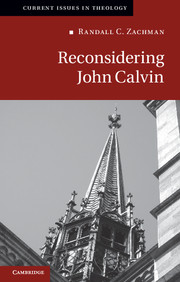Book contents
- Frontmatter
- Contents
- Abbreviations
- Introduction
- 1 The beauty and terror of the universe
- 2 The bond and critique of all social union
- 3 The one elect people of God
- 4 The restoration of Israel by gospel and law
- 5 The comfort and the challenge of love
- 6 Hoping for all others, fearing for myself
- Conclusion
- Index
- References
5 - The comfort and the challenge of love
John Calvin and Søren Kierkegaard
Published online by Cambridge University Press: 05 June 2012
- Frontmatter
- Contents
- Abbreviations
- Introduction
- 1 The beauty and terror of the universe
- 2 The bond and critique of all social union
- 3 The one elect people of God
- 4 The restoration of Israel by gospel and law
- 5 The comfort and the challenge of love
- 6 Hoping for all others, fearing for myself
- Conclusion
- Index
- References
Summary
I would now like to consider how it is we come to know ourselves, and I will be bringing Søren Kierkegaard into conversation with John Calvin. I personally think that this is the most important element of the Christian life, and I love Calvin because he makes this theme an essential aspect of every theological topic. His basic conviction is that if you think you know God, but you do not come to know something about yourself thereby, you do not really know God. And if you think you know yourself, and you do not come to know something about God thereby, you do not really know yourself. Calvin is one of the rare figures I can think of in the Christian tradition that joins these two forms of knowledge together in a consistent way. And I am joining him, not surprisingly, with Søren Kierkegaard, who also viewed faith as a kind of transparency that rests in the power that established it, which is God. So both of them are very concerned to establish a kind of transparency of ourselves to ourselves before God. Rather alarmingly for both of them, we are already completely transparent to God. So human beings are already completely exposed to God, right down to our deepest secrets. The problem is that we are completely concealed from ourselves. So how do we go about becoming more and more transparent to ourselves? That is going to be the task for this chapter. I will start with Calvin’s discussion of this, culminating in his description of the human being alone in conscience before the judgment seat of God. And the question I will ask, then, is: Can we really know ourselves before God’s judgment? Will standing before the judgment seat of God, the tribunal of God, really allow us to become transparent to ourselves before God? The segue to Kierkegaard will be Kierkegaard’s assertion that it is not God’s judgment that allows us to become transparent to ourselves, because this transparency must be voluntary for both theologians, but rather it is love. This means that the love of God is simultaneously deeply terrifying and deeply consoling.
- Type
- Chapter
- Information
- Reconsidering John Calvin , pp. 120 - 151Publisher: Cambridge University PressPrint publication year: 2011



